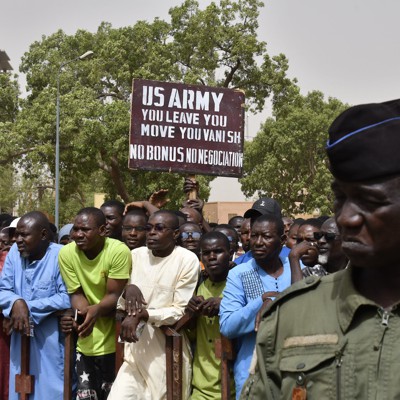Published in coordination with the 2024 Global Security Forum, of which Defense One is a media partner.
The forced closing of two U.S. military bases in Niger and the hasty withdrawal of a much smaller group of special operations forces personnel from neighboring Chad are notable setbacks for the counterterrorism effort in the Sahel and for broader U.S. interests in the region. But even more significant is what these developments portend for the “new rules of the game” of geopolitics in Africa: amid emerging realities, America and her allies must adjust their approach.
At stake is the course of increasingly deadly conflicts and violence running across the African continent from the West African states on its Atlantic coastline to Sudan and Somalia on the Red Sea and Indian Ocean. As the 2024 Global Terrorism Index Report underscored, the epicenter of terrorism has shifted from the Middle East and North Africa to Sub-Saharan Africa, concentrated in the Sahel region, which now accounts for almost half of global deaths from terrorism. But beyond this immediate security concern there is also the reality of an Africa that is not just economically vibrant—it is home to nine of the 20 countries that the International Monetary Fund expects to experience the fastest growth rates in 2024—but, thanks to its abundance of metals and other critical minerals, is indispensable for the energy transition and new technologies. To cite just one example, cobalt is the key ingredient for the manufacture of electrodes for rechargeable batteries. Slightly more than half of the 11 million metric tons of total global reserves of cobalt are found in the Democratic Republic of the Congo, which accounts for nearly 75 percent of overall production of the metal, according to the most recent data from the U.S. Geological Survey.
If Africa is more important than ever to the strategic interests of the United States and its international partners, then they must adapt their approach to the continent and its nations to make themselves more relevant to the priorities of Africans.
First, African countries nowadays have multiple options to choose from and their leaders know it. This might seem trite, but as the recent spectacular failure of a high-level U.S. delegation to Niger whose head was publicly accused by the country’s authorities of having a “condescending attitude” toward her hosts indicates otherwise. When countries like Niger and Chad, which tied for fourth from the bottom on the most recent Human Development Index, can tell the United States to go, can there be any doubt that the dynamic has shifted and that lectures from Washington (or Paris or London or Brussels) are not only ineffectual, but downright counterproductive?
Second, in making their choices, many African governments will prioritize their immediate needs over longer-term interests. In most cases, they are aware of the tradeoffs, but, as one post-coup head of state told me last year, “I know what I would do if I was certain that I have five or ten years, but I have to focus on today’s challenges just to be sure that I have tomorrow.”
Reform programs and development initiatives to which international financial institutions and Western governments devote considerable resources may eventually be effective, but they rarely deliver quick political wins or even basic regime security. Some even destabilize precarious societal balances, at least in the short term. Consequently, competitors like Beijing and, more recently, Moscow and even Teheran, have exploited this. In late 2021, Russia’s Wagner Group gained entrée to Mali after Biden administration appointees denied that country’s regime an export license for a transponder needed for a military transport plane.
Third, it is not just African regimes prioritizing security over other concerns: increasingly, so do the masses. Witness by the outpourings of popular support that have greeted the juntas which have seized power in Africa’s eight successful coups since 2020. While one can debate whether military rule can ultimately deliver the sought-after stability, for now Western lectures on democracy and governance will fall on deaf ears with populations beset by the failure of governments to curb mounting violence. In 2023, Burkina Faso saw deaths from terrorism rise 68 percent and account for nearly one-fourth of terrorists’ global casualties.
Finally, rather than trying to force African interlocutors to make “us-vs.-them” choices, Washington would do better to focus on building coalitions, and not just with its historic Western allies (in which group I would include Japan). U.S. officials should look to regional powers such as India, the Gulf Arab states, Morocco, or even Turkey that might be like-minded or at least have complementary interests in Africa, to see if together these ad hoc partnerships can offer a better value proposition than competing revisionist powers. An example is the tacit understanding between the Washington and several Gulf Arab states for their sovereign wealth funds to buy stakes in strategic mining assets in several African countries. This tack is helping the Arab states’ plans to diversify their economies by processing and trading critical minerals as well as building up high-tech industries, but is also helping to ensure American access to strategic metal supply chains not dominated by China.
The geopolitical (and geoeconomic) stakes in Africa have never been so high, the challenges remain myriad and complex, and the competition is stiff, but the potential returns are, quite literally, for the United States and its allies as well as for African countries and people themselves, the century itself.
Ambassador J. Peter Pham is former U.S. Special Envoy for the Great Lakes and Sahel Regions of Africa and a distinguished fellow at the Atlantic Council.
Read the full article here


:quality(70)/cloudfront-us-east-1.images.arcpublishing.com/archetype/2TCLA6XIY5EFZLS2GXQTD6Z7PI.jpg)



:quality(70)/cloudfront-us-east-1.images.arcpublishing.com/archetype/QS3AZHSSERAWHPAKNRANUAXTAI.jpg)
Leave a Reply